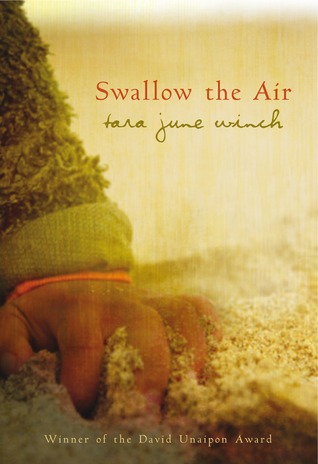Swallow the Air, by Tara June Winch.
 Swallow the Air, by Tara June Winch. University of Queensland Pr (Australia) (2006), Hardcover, 201 pages.
Swallow the Air, by Tara June Winch. University of Queensland Pr (Australia) (2006), Hardcover, 201 pages.
AUSTRALIAN WOMEN WRITERS
INDIGENOUS WRITERS WEEK
A bittersweet story by an Australian Indigenous woman, about a girl who loses her family and searches for her place in the world.
This fine novel consists of a cluster of short incidents from the childhood and teenage years of May Gibson, the Indigenous girl who is its narrator. Her father, more dreamed about than real, had left the family in poverty when she was small. She retained strong love for her mother, an Indigenous woman whose stories warmed her children’s hearts. But “Mum” had been so abused by her violent husband she had lost her will to live.
I remember now, my mother had been a beaten person. She wouldn’t scream at his fist, she wasn’t the kind to fight his torments. She bottled all the years, too; until one day all those silent screams and tears came at once. And with such force they took her away. The screams must have been so deafening, the river of tears so overflowing that the current could only steal her away. The flood breaking so high, that she had to leave us behind. We couldn’t swim either.
May and her beloved brother went to live with their aunt, a loving woman, but one vulnerable to her bottle and to abusive men. “She held her booze like a butcher’s knife, cleaving off each part of her self.” The children played in the sea and celebrated small victories, but were hemmed in by poverty and the reality of their black skin. Her brother left when she was 15, and May wandered into the slums of Sydney where she became part of an urban “mob.” She explored the city and made a few close friends, but a surrogate mother convinced her that she needed to leave before she was destroyed as so many others had been. “I knew that I had to get out of the city, get out of the boxes they put you in.” May sets out on a journey to find her mother’s people, but the novel ends with an unexpected and satisfying twist.
Tara Winch is a fine writer. Her prose is rich and descriptive, full of evocative landscapes. Her sentences have bite and power. At times her writing is close to poetry, with poetry’s lack of concern for ordinary grammar. Dreams and nightmares blur into the concrete reality of her narrative. A few explicit Indigenous words are included, but the book is never hard to read. In the hands of some writers, the plot line of the novel could be grim, but never in those of someone as attuned to beauty as Winch. She gives May fleeting times of joy, with her beloved brother, her dysfunctional aunt, the African man at the car wash, and other loving individuals she encounters. In some sense, this is a coming of age story, but not one about sexuality.
While there is no indication that this book is autobiographical, Winch is able to takes readers inside the life of a character who is caught on one of the paths in which Indigenous people often, but not always, find themselves. However, Winch, like May, was born in Woologong, and is of English, Afghan, and Wiradjuri ancestry. She seems to understand the current conditions of Indigenous life and to be able to write from an Indigenous perspective. At the same time she has created a story that resonates with all of us who have ever wanted to belong somewhere. In doing so, Winch has written story which is both specific and universal. For me, such narratives are essential to good literature. May is a whole person, never reduce to her ethnicity.
I strongly recommend Swallow the Air to those interested in the variety of Indigenous Australian life and to all who enjoy a well-written story.


Trackbacks